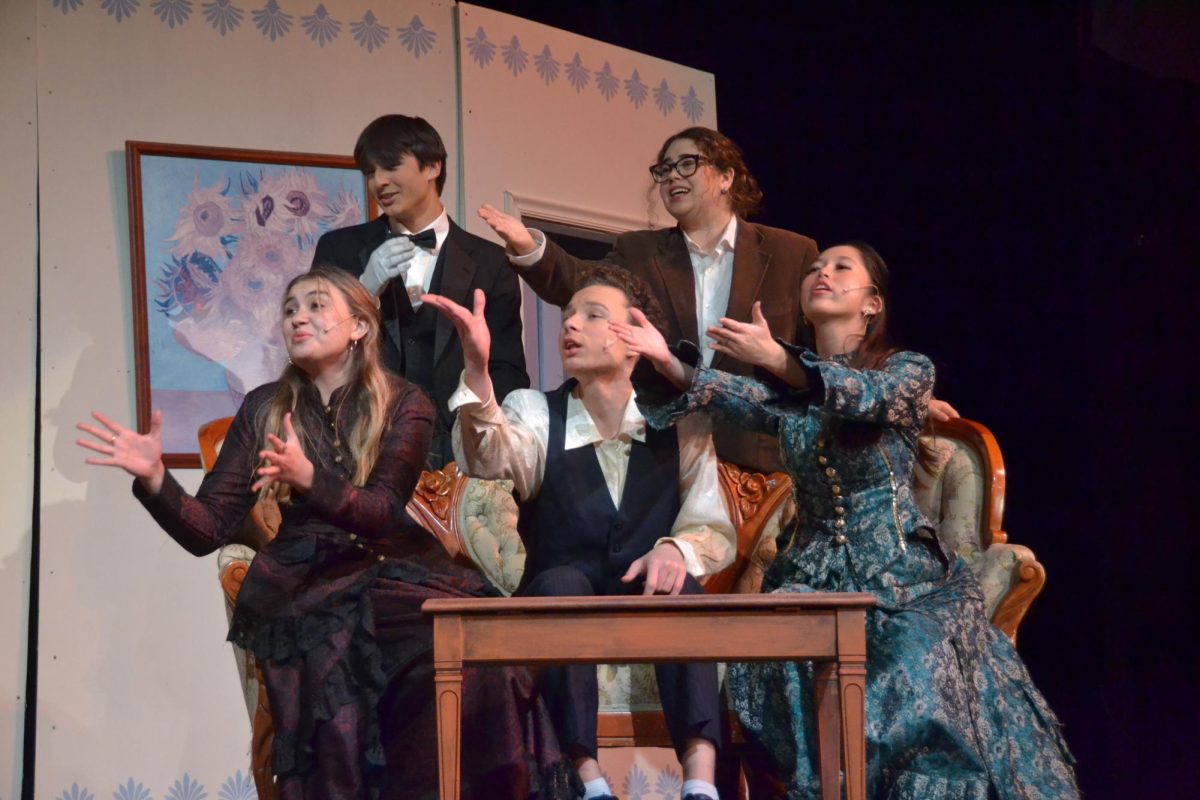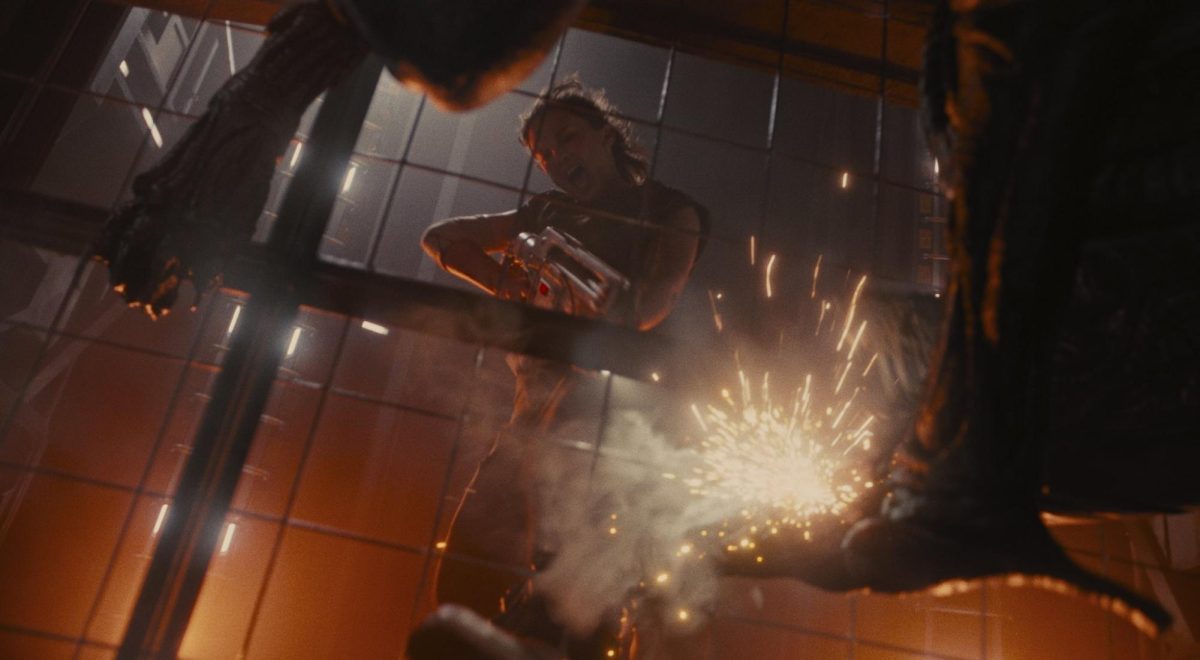Inside a French mansion, two women in bright, elaborate dresses sit down on an ornate couch as one gossips to the other about her scandalous suspicion: her husband is cheating on her.
“This put a flea in my ear, alright,” she proclaims as she holds up her husband’s pair of suspenders mailed from the notoriously shady Frisky Puss Hotel — undeniable evidence of his infidelity.
Whitman Drama’s fall play, David Ives’ contemporary adaptation of “A Flea in Her Ear,” is a classic French farce originally written by Georges Feydeau. The play centers around the complicated workings of a group’s relationship dynamics at the turn of the 20th century. The show ran on Nov. 9, 10 and 11 at 7:00 p.m.
Raymonde Chandebise (senior Ashley Scharpf) believes her stoic insurance executive husband Victor Chandebise (sophomore Ryan Robbins) has been unfaithful, so she hatches a plan to write him an anonymous love letter, which should trick him into revealing his infidelity. She instead sets into motion a chain of events involving mistaken identities, love triangles and false accusations.
“A Flea in Her Ear” is a classic example of a farce: a type of comedy marked by exaggerated, satirical humor and an improbable plot. Georges Feydeau wrote the original play at the height of the Belle Époque, a period in French history characterized by optimism and economic prosperity, reflected in the lively nature of the play.
The play was the first installment of Whitman Drama’s “season of scandal,” featuring “debauchery, secret rendezvous [and] nefarious plots,” Director Tyler Herman wrote in his vision statement. The winter musical, “Cabaret,” an eccentric yet dark dance-driven production, will follow in February.
Herman wanted something lighthearted and humorous to kick off the season, in contrast to last year’s play, “Marie Antoinette,” a political satire.
“I’ve always wanted to do a comedy play, and this seemed like the right moment,” Herman said. “We’re just responding to the world with humor, having this be a bit of an escape for people to come and delight in the frivolity of what happens on stage.”
Physical comedy and wordplay were central to the show’s humor. Actors delivered random monologues under spotlights and chased each other through hallways. The script also contained sexual innuendos, including the name of the “Frisky Puss Hotel,” where much of the play took place.
Despite the chaotic nature of the story, the play required great coordination of the actors and tech crew, Herman said. In his program note, he wrote that comedies are difficult to execute, even more so than dramas.
“This play is one of the oldest farces that we have in the Western canon,” Herman said. “It has to work like clockwork. It’s got a lot of moving pieces that have to move at the same time at the right speed.”
Robbins played two different characters of opposite personalities and frequently switched between them. While Victor Chandebise is a rigid, respectable businessman, Poche — who looks exactly like Victor — is a naive and moronic bellboy. To achieve this comedic dichotomy, Robbins worked on changing his physicality to fit the different characters. When he played Chandebise, he stood up straight and led with his chest, while as with Poche, he hunched over.
“I got to learn a whole lot,” Robbins said. “I didn’t know much about farces before the show. Now I get to do [a farce] not with one but with two very different characters.”
The set, spanning the whole stage, was integral to the plot. The entirety of the play took place either inside the Chandebise residence or the Frisky Puss Hotel. The Chandebise house was lighter toned to convey openness, while the hotel was a bold red color, said Scenic Designer Caroline Melmed, a senior.
Melmed, who began working on scenic design in seventh grade at Pyle, designed the set throughout the summer and fall with Herman, using design boards to brainstorm ideas. The set was much larger than sets from previous shows, which resulted in challenges with timing partially due to other events in the auditorium interrupting work time.
One of the set’s highlights was a spinning bedroom in the Frisky Puss Hotel. The bedroom spun around whenever a person pushed a red button, allowing for a quick escape if someone were to walk in on their affair. For Melmed, the room was the most challenging part of the set to design and put together, taking her and her team around two weeks to build. Melmed faced many challenges with measuring, situating the platform and ensuring it spun correctly.
Doors were also vital to the show’s plot, so the Scenic Crew had to position them carefully to ensure everything would move smoothly.
“The doors were extremely hard to put on because the hinges are so meticulous that if you put it on even a slight degree off, it won’t fit within the frame,” Melmed said. “They have to align perfectly because when you slam the door it’s an all or nothing — it either works or you bang the whole wall.”
The Scenic Crew worked closely with the General Crew — led by Technical Director Skai Glasser — to construct the set. The two teams, collectively known as the “sceneral” team, used power tools and other set-building equipment to build and decorate the set.
To Melmed, one of the most rewarding aspects of her role is teaching crew members skills they can use outside of Whitman Drama for their projects going forward.
“It’s really meaningful to me knowing that they’ll use something I taught them later on in life,” she said.
While the Running Crew changed the set from the Chandebise residence to the hotel, five members of the cast entertained the audience with live music on stage: Allison Khani on the saxophone, Aden Jacobs on the drums, Ace Ritter on the bass, Santi De León Pereira on guitar and Nisan Naz Kutlukaya on the ukulele. Whitman alum Sammy Strent (‘20) composed the music they played.
Months of planning went into costumes as well. As one of the costume designers, junior Jasper Murray and his team heavily researched the fashion of the period and were inspired by the bright color palette of Wes Anderson’s “The Grand Budapest Hotel.”
The Costumes Crew also had many challenges to overcome. Robbins switched between two characters, sometimes within one scene, so they had to design his costumes very particularly, ensuring that they came on and off efficiently. They also had to coordinate with the Props Crew because some items were used as both costumes and props, Murray said.
Participants had to balance play rehearsals with school and other extracurriculars, which to Scharpf was a challenge, especially as a senior. Despite this, she values having a safe space to decompress and be herself after school.
“I’ve enjoyed playing a different type of character than I usually play, which has been a learning experience,” Scharpf said. “I also enjoyed getting to know new people. Especially in this cast, I noticed that there’s a lot of new people, and it’s really fun to work with people that you’re not really familiar with because you grow with them and it’s really cool.”
Actors and tech rehearsed and prepared for weeks leading up to two tech weeks, where they would stay as late as 10:00 p.m. doing technical work and dress rehearsals to put every team’s work together.
Despite the large commitment, working on the show was a fulfilling experience for Murray because of the opportunity to participate in the tight-knit Whitman Drama community.
“Everybody here really wants to be here,” he said. “Everybody shows up as their best self and works really hard. It’s Whitman culture to work super hard, and that really shows through in the drama department.”
















